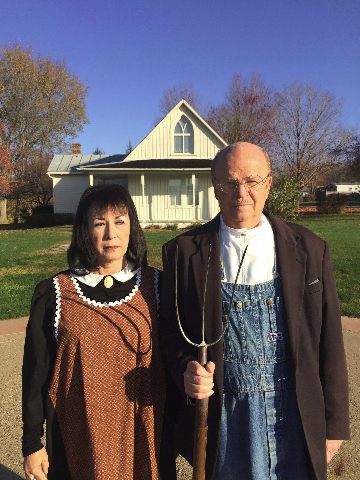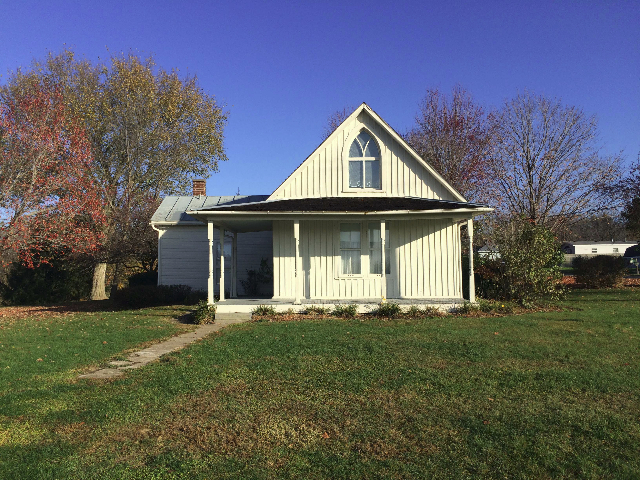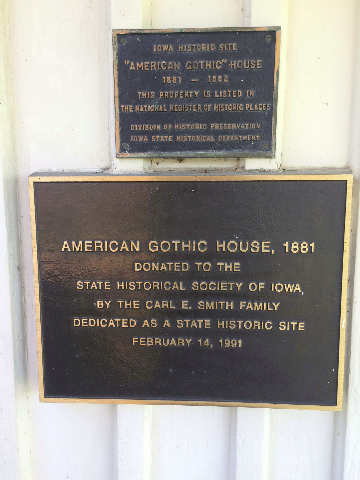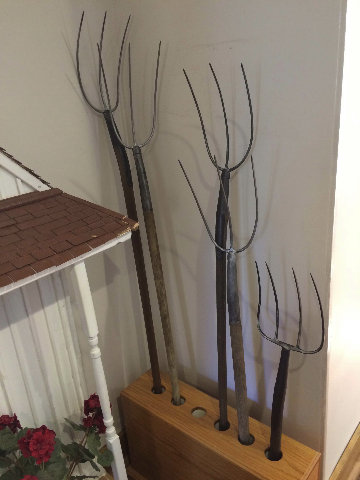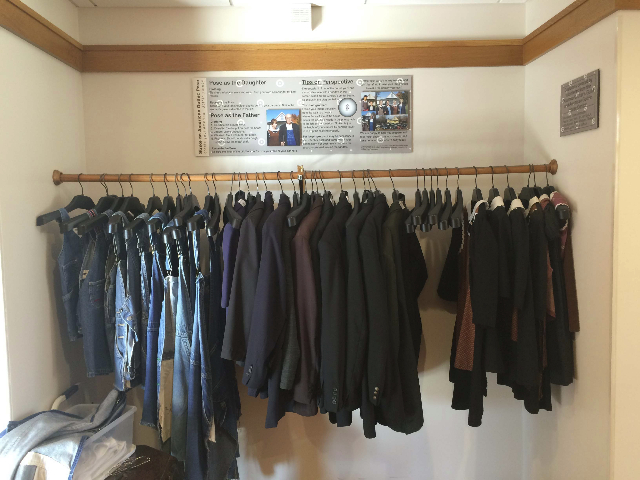Grant Wood's American Gothic
Iowa's Most Famous Artist
By: Susan Cohn - Dec 10, 2016
THE MOST FAMOUS (SMALL) WHITE HOUSE IN AMERICA: GRANT WOOD’S AMERICAN
GOTHIC DRAWS VISITORS TO ELDON, IOWA.
A dour farmer, wearing overalls and a jacket and clutching a pitchfork, poses rigidly next to a
pinch-faced, apron-clad woman who gazes sideways into the distance.
Behind them is seen a modest white farmhouse whose second floor window
has a pointed arch. Unlikely subjects for what is now one of the most
recognized paintings in the world, but this is what Grant Wood’s
American Gothic has become since he painted it in 1930 for a
competition at the Art Institute of Chicago. The painting is now in
the Institute’s permanent collection. The little farmhouse still
stands in Eldon, Iowa, where Wood saw it (only once) during a brief
stay. With its listing on the National Register of Historic Places in
1974 and its donation in 1991 to the State Historical Society of Iowa
by its last private owner, the house is secure in its original
location. Now, visitors come from all over the world travel to spend a
little time in Eldon, to see the place that inspired Wood’s
masterpiece, and to make themselves a little part of its story.
GET IN THE SPIRIT AND PUT YOURSELF INTO THE PICTURE.
Steps from the farmhouse is the American Gothic House Center, which contains displays
about Grant Wood and the creation of the painting as well as a
collection of the painting’s parodies. The Center generously provides
various sizes of the apron, overalls, suit jackets, antique glasses
and hayforks to encourage visitors to pose in front of the house and
create their own American Gothic portrait. To help personalize the
portrait, visitors can substitute an implement of their trade (in
place of the hay fork held by the man) or a piece of their own jewelry
(in place of the broach worn by the woman).
American Gothic House Center Administrator Holly Berg said, “Most
visitors are very excited at the opportunity to put themselves in the
picture. Sometimes it takes a little coaxing to get a reluctant spouse
or teenager involved, but once they don the costume they get in the
spirit. It does amaze me the number of visitors that come prepared for
their photos. One group of sisters came dressed in their father's
iconic overalls as a tribute to him. Another couple as Batman and
Robin and wrote in the guest book that they were from Gothic City
(instead of Gotham). The stories, both touching and goofy, are
endless! And though the parody photos are a fun experience, it is
always interesting to see how many people notice something about the
painting they didn't realize until they put themselves in it--such as
the daughter's shoulder slightly behind the fathers, or her off to the
side glance. It always ends up being a fun, but educational experience
at the same time.”
AMERICAN GOTHIC HOUSE PARTICULARS.
The American Gothic House is located at 300 American Gothic St. in Eldon, Iowa. Tours of the
downstairs portion of the house are given the second Saturday of the
month, April-October from 10 a.m. – 4 p.m. Due to the historic
features of the house and grounds, accessibility for visitors with
limited mobility can be challenging. The adjacent American Gothic
House Center, “photo-op” area, and parking lot are all accessible. For
more information, call 641-652-3352 or email
TheAmericanGothicHouse@gmail.com. Admission to the Center is free.
American Gothic by Thomas Hoving is an entertaining biography of the
painting.
GRANT WOOD AROUND IOWA.
Grant Wood (February 13, 1891 – February 12,
1942) is Iowa’s most famous artist. He was born on a farm near Anamosa
but moved to Cedar Rapids when he was ten years old after the death of
his father. From then on, Wood lived most of his life in Cedar Rapids
or Iowa City, dying of cancer the day before his 51st birthday. In
addition to the American Gothic House in Eldon, Iowa sites connected
with his life and works include the Grant Wood Gallery and Visitor
Center in Anamosa; the Grant Wood Studio and Home in Cedar Rapids;
Grant Wood’s House in Iowa City; and Riverside Cemetery in Anamosa.
Grant Wood’s Iowa by Wende Elliott and William Balthazar Rose is a
useful guide for those laying out a tour.
AND REMEMBER: “I had to go to France to appreciate Iowa.” Grant Wood.
Susan Cohn is a member of the North American Travel Journalists
Association, Bay Area Travel Writers, and the International Food, Wine
& Travel Writers Association. She may be reached at
susan@smdailyjournal.com. More of her stories may be found at
http://ifwtwa.org/author/susan-cohn.

